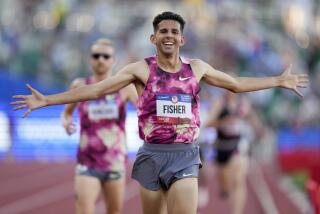Prep Miler Knows About Being on the Run : Track and field: Ben Mesfen came to the United States 11 years ago from Ethiopia. Now he is a standout at Venice High.
- Share via
Every so often, Ben Mesfen, a senior miler at Venice High, remembers the night his family decided to leave civil war-torn Ethiopia because the future in their native country did not look bright.
Mesfen, 17, remembers how frightened he was as a 6-year-old, traveling 500 miles in a small caravan across the desert to neighboring Sudan. He remembers the family having to leave his father behind, and his mother and younger sister walking alongside him during the night in constant fear of being caught. He remembers telling himself not to forget.
“I think that I have extra motivation to be disciplined,” Mesfen said. “When you think about it . . . nothing that I do now is as harsh as walking 500 miles at night across a desert.”
Said Mesfen’s mother, Saba: “We talk about the past a lot. We talk about where we came from. Ben is very smart. He remembers everything.”
These are memories that have helped motivate Mesfen to become one of the best middle-distance runners in the nation.
Mesfen, coming off an outstanding cross-country season, will take his running talents indoors tonight in the Sunkist Invitational track meet at the Sports Arena. He will compete against a strong field, including Louie Quintana of Arroyo Grande and Ricky Gallegos of Crystal City, Tex., in the national high school mile.
After running in the shadow of All-City teammate Danny Jordan for two years, Mesfen began to emerge near the end of last season. With Jordan, a freshman at Southern Methodist, out with an injury, Mesfen boosted his confidence in last year’s state meet, finishing sixth in the 1,600 meters with a career best of 4 minutes 13.4 seconds. Before that, he had not run the distance under 4:20.
“That was a big drop in time,” said Chris Hieatt, Venice’s track coach. “He should have been running like that all along based on workouts. But, (Jordan and Mesfen) developed a pecking order where Ben always finished behind Jordan.
“Ben has been pretty lucky in that he’s been able to run with some pretty good kids his first two years. So, there has not been a whole lot of pressure on him. But he’s a stronger runner than Jordan. He’s so smooth. He can float a 62-second quarter and not get tired, which is not common in a high school runner. I’m real anxious to see how he does this year.”
One would think that Mesfen’s track success might be attributed to his African background. Ethiopia is well known for its distance runners, among them Olympic marathon gold medalists Abebe Bikila, who won in 1960 and 1964, and Mamo Wolde, who won in 1968, along with Miruts Yifter, who won the 5,000- and 10,000-meter championships in 1980. But that’s not the case.
“I was never aware of the running tradition in Ethiopia,” Mesfen said. “I was too young. The only sport I played was soccer.”
It was not until he was in the United States that Mesfen became interested in track.
After he and his family made it safely to Sudan, they quickly signed up for emigration and sent pictures for sponsorship to the United States.
“There was no plan when we first got to Sudan,” Mesfen said. “We waited for three or four years and I started to give up hope, when suddenly we get a letter stating that we had been sponsored by a family in Oregon.”
And in Oregon, which by many is considered the running capital of the nation, Mesfen began his track career. In Roseburg, population 1,500, he was an unsuccessful sprinter in fourth grade.
There also was a good deal of culture shock.
“We were like refugees,” Mesfen said. “We knew some people in Sudan, but once we got here everything was new. I remember being really scared and unsure for the first time when we got to New York City before flying to Oregon.
“New York was so cold and we had to stay there for a couple of days. Everything was such a different experience. The elevator ride in the hotel we stayed in was amazing. It was a 10-story building and we were on the top floor.”
Although several languages are spoken in Ethiopia, Mesfen and his family spoke only Tigrinya, the native language of their home province, Eritrea, and the problem was exacerbated by Mesfen’s lack of schooling.
“In Sudan, we couldn’t afford school,” he said. “I only went when we had the money. Somehow, I tried to get a little education, but I didn’t go to school full time until I got to Roseburg.”
As Mesfen tried to catch up in school while learning a new language, his family had to adjust to being the only black residents in town.
“I had never really been around any other type of race before, and I was the only black kid throughout elementary school and junior high school,” Mesfen said. “When I went to my first class, the treatment was different. They looked at me strange until a teacher told them about my story.
“After that, the kids started to come to me and ask questions like, ‘Did you have elephants in your back yard?’ Sometimes, there was name calling, but I didn’t know what they were talking about. Once, a car drove by and a guy said, ‘Nigger, get out of here,’ but I didn’t know what it meant. I just knew the tone was different.”
After eight years, Mesfen’s father finally made it out of Ethiopia to Saudi Arabia and eventually was reunited with his family.
His arrival, though, complicated things. The family had begun to call Roseburg home. With his mother going to adult school and working at a nearby hospital, Mesfen and his sister were happy in their new town.
“I felt left out when my father came,” Mesfen said. “For years, we had only kept in touch by letters. When he returned, I was no longer the man of the family.”
Mesfen’s father, a mechanic in Ethiopia, soon decided to move his family to Culver City after visiting a friend in Los Angeles and seeing more opportunity to work.
Once in Culver City, Mesfen’s track career began to pick up. In the summer before his sophomore year, Mesfen ran away from his competition in an all-comers meet at Venice High. It was there that Hieatt first saw Mesfen.
“He was in front of everybody by at least 200 meters,” Hieatt said. “I was glad when I found out that he was going to come here.”
Mesfen’s goal this track season is to run under 4:10 in the mile. He hopes that running against Quintana, who has a good chance to run under four minutes this outdoor season, will help him.
“I want to stay competitive with him and maybe give him a scare a little bit,” Mesfen said. “I want to keep him from getting bored.”
More to Read
Go beyond the scoreboard
Get the latest on L.A.'s teams in the daily Sports Report newsletter.
You may occasionally receive promotional content from the Los Angeles Times.










